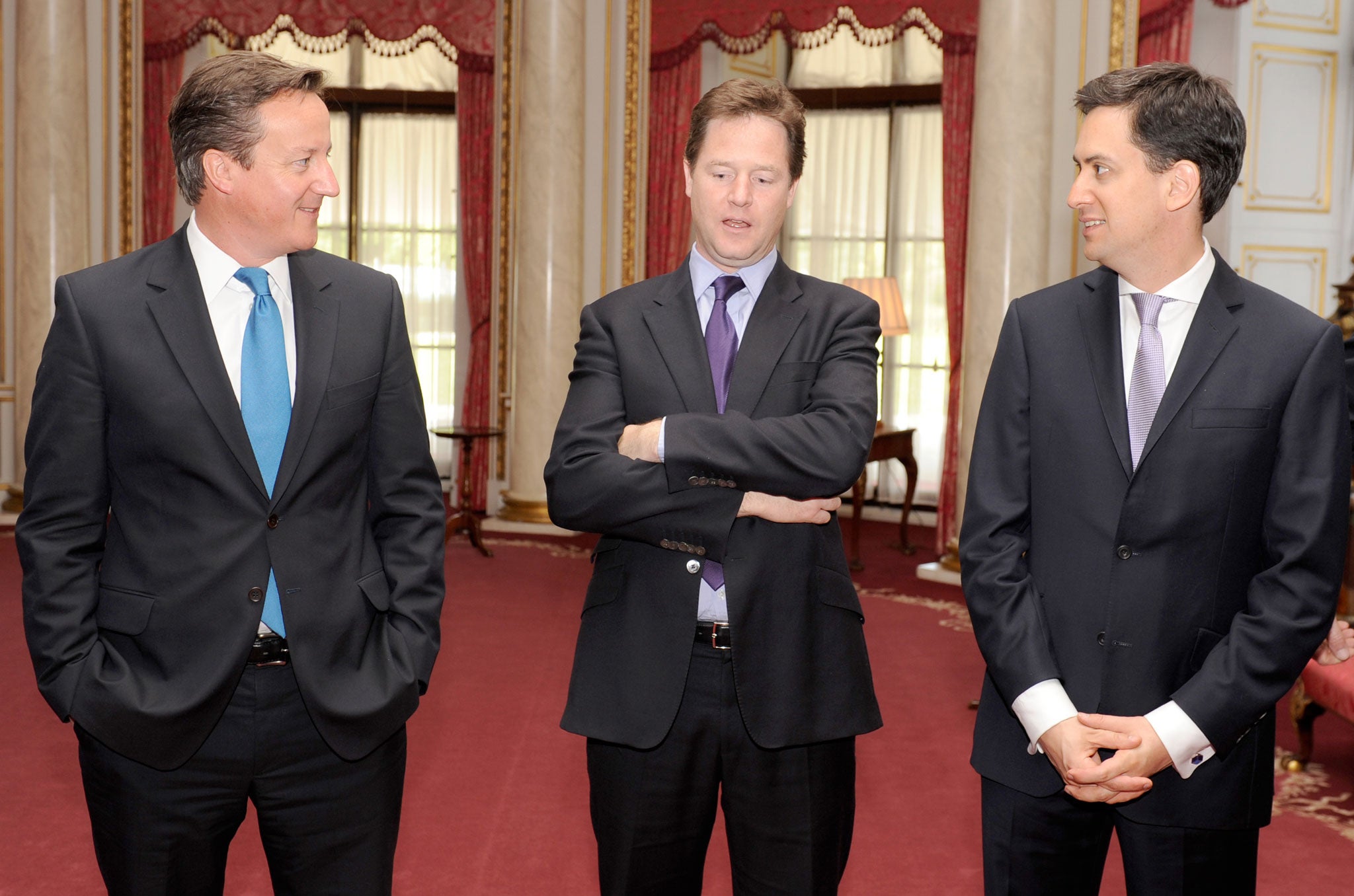No winners in poll of polls as Tories, Labour and Liberal Democrats fail to seize initiative
The Independent’s survey shows it has not been a good year for the three main Westminster parties

The Conservatives have halved Labour’s opinion poll lead over the last year, while support for the UK Independence Party has slowly ebbed away from a dramatic peak in the spring, The Independent’s latest poll of polls discloses on Tuesday.
As the political parties enter 2014, the findings will provide David Cameron with grounds for cautious optimism that the Tories can claw back the narrowing Labour advantage by the time of next year’s general election.
A weighted average of last month’s polls puts the Conservatives on 33 per cent (up one point since December 2012), Labour on 38 per cent (down three), the Liberal Democrats on 10 per cent (down one) and Ukip also on 10 per cent (up two).
Labour’s lead under Ed Miliband was nine points at the turn of last year and grew to 13 points by February, but stands on Tuesday at just five points.
That would still be enough to propel the Labour leader into Downing Street with an overall majority of more than 50 seats, but the gradual softening of the party’s vote over the last 12 months will alarm Labour strategists.
John Curtice, professor of politics at Strathclyde University, who calculated the averages, said 2013 had not been good for the Tories, Labour or the Liberal Democrats, who had all been “left in the shade by the most serious independent fourth party incursion in British political history”.
Although many Conservative MPs believe the best they can hope for after the May 2015 election is another Tory-led Coalition, they are optimistic that their support can be bolstered during the next 16 months if the economic recovery gathers pace.
The Prime Minister and Chancellor George Osborne plan a series of events in the coming months in an effort to turn the political spotlight on to the economy and growing levels of employment.
Meanwhile, Labour aims to intensify its focus on falling living standards as prices continue to outstrip wages, with Ed Balls, the shadow Chancellor, due to spell out the party’s economic message in a major speech in three weeks’ time.
Its problems are underlined by the continued grim personal ratings for Mr Miliband, although they have recovered marginally in the final months of 2013.
The latest poll of polls also brings renewed gloom for the Liberal Democrats, who show no sign of recovering from a catastrophic collapse in their support at the end of 2010, just six months after they entered the Coalition.
On their current polling they could lose more than half of their 57 parliamentary seats, although the party insists the incumbency factor will help its MPs. It has also been heartened by a recent increase in membership.
Ukip ends 2013 level-pegging with the Liberal Democrats, underlining its argument that Britain now has a four-party system.
However, its support peaked at 15 points in May and has fallen back by one-third since then, suggesting it could have been affected by rows over the views of prominent members.
Nigel Farage’s party is hoping for a renewed boost by topping the poll in May’s elections for the European Parliament, a result that would intensify Tory nerves if the Conservatives are relegated to third place.
Ukip said on Tuesday that its membership had risen by two-thirds to 32,500 over the last year.
All parties are anxiously waiting to see whether there is any political fall-out from the lifting on Wednesday of the transitional controls on workers from Romania and Bulgaria.
“This has, in truth, not been a good year in the polls for any of the three main Westminster parties. None can claim to have made significant progress,” said Professor Curtice.
He added: “In 2014 the Westminster parties enter what is always relatively difficult territory for them – European elections.
“Voters have previously demonstrated a relative willingness to leave their Westminster loyalties behind in such elections.
“Now that those loyalties look weaker than ever, the gap between the preferences of voters and the preoccupations of Westminster may be about to become even starker.”
He continued: “Tory MPs should not be comforted too much by the fact that their party remains ahead of Labour on the economy; dissatisfied voters have decided that alternatives other than Labour are available instead.”
Subscribe to Independent Premium to bookmark this article
Want to bookmark your favourite articles and stories to read or reference later? Start your Independent Premium subscription today.

Join our commenting forum
Join thought-provoking conversations, follow other Independent readers and see their replies